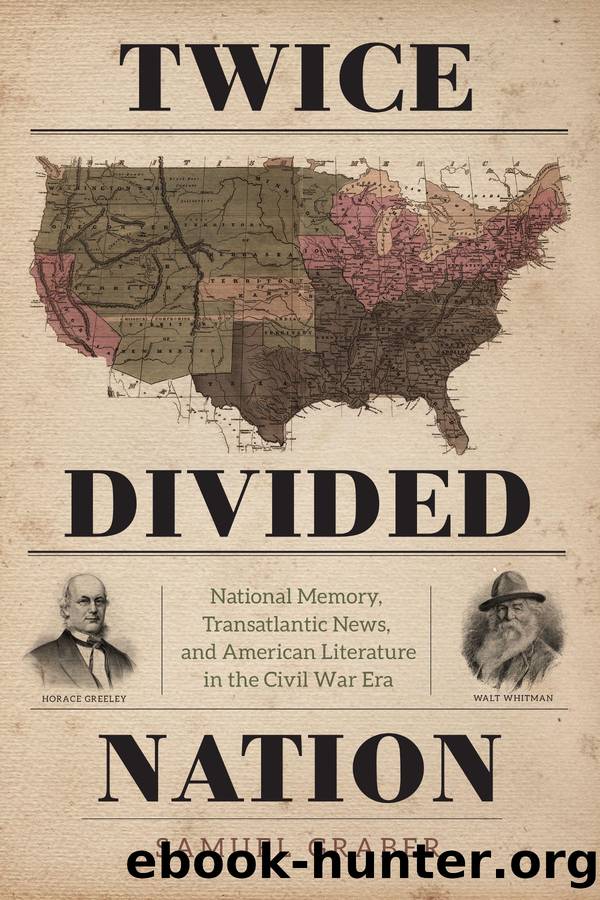Twice-Divided Nation by Graber Samuel;

Author:Graber, Samuel; [Graber, Samuel]
Language: eng
Format: epub
Tags: LIT000000 Literary Criticism / General, LIT004020 Literary Criticism / American / General
Publisher: University of Virginia Press
Kansas-Nebraska: Unpopular Sovereignty
Buchanan and other American leaders sought to annex Cuba as part of a larger movement to expand the American slave system. One thrust of the proslavery plan sought the acquisition of new territory in the Caribbean and as far away as Central America. But another involved organizing new slave states within established US territory. The push to bring slavery to Kansas, a sparsely settled western region where it had been tacitly banned since 1820, would radically alter the American political landscape and create a new focal point for nationalist anxieties that were also fermenting throughout the transatlantic news.
The crisis began with the passage of the Kansas-Nebraska Act, legislation that laid out the terms under which the new territory would achieve statehood. Like Britainâs original war strategy, the act emerged from expansionist agendas pursued in the name of national interest. Yet, like the Crimean adventure, it inaugurated a period of national division and threw national politics into turmoil. Thus an expression of Americaâs continental ambitions ensured that its territorial destiny would be anything but manifest.
Introduced by Senator Stephen A. Douglas, one of the Compromise of 1850âs architects, the new act extended the southwestern territoriesâ right to decide the slavery question to the as-yet unorganized territories ceded to the United States in the Louisiana Purchase. In essence Kansas-Nebraska revoked the already weakened Missouri Compromise by rescinding the Free Soil status of the land immediately west of Missouri. This dubious alteration of a long-standing agreement arrived cloaked in the democratic-sounding mantle of âpopular sovereigntyâ but was neither democratic nor popular. Interpreted in different ways by different factions, it inspired little support and much anxiety among the northern public, and its application caused one of the more bizarre parodies of self-government in US history.22
By allowing recent settlers to decide Kansasâs slavery question, the law divided the territory into two distinct camps, each with its own version of Kansasâs place in national history and each with contradictory visions of its future. Pro- and antislavery groups raced to Kansas, many of them less interested in settling than in settling the slavery issue, and they brought weapons to complement their respective arguments. Some Missouri border jumpers only stayed long enough to vote proslavery candidates into office and roust their opponents from their land if not their convictions. Northerners following the news from afar, and harkening to the many sermons, speeches, and editorials delivered by powerful antislavery advocates, funded Free Soil settlements and sent guns to defend them. While the transcendentalist minister Theodore Parker insisted that Kansas had finalized a deep national division and that âno moral union makes the two one,â the Tribune called for more guns, bodies, and blood to ensure Kansas entered the Union as a free state.23 Pro- and antislavery governments sent dueling constitutions to Washington for approval, forcing their consideration not just by politicians but also by all who followed the news. As it played out in the papers, Kansasâs divided history exacerbated conflicts between and within national political parties, breaking the two-party system and splitting the branches of government.
Download
This site does not store any files on its server. We only index and link to content provided by other sites. Please contact the content providers to delete copyright contents if any and email us, we'll remove relevant links or contents immediately.
The Vikings: Conquering England, France, and Ireland by Wernick Robert(79222)
Ali Pasha, Lion of Ioannina by Eugenia Russell & Eugenia Russell(39939)
The Vikings: Discoverers of a New World by Wernick Robert(36830)
The Conquerors (The Winning of America Series Book 3) by Eckert Allan W(36715)
Cecilia; Or, Memoirs of an Heiress — Volume 1 by Fanny Burney(32092)
Cecilia; Or, Memoirs of an Heiress — Volume 3 by Fanny Burney(31481)
Cecilia; Or, Memoirs of an Heiress — Volume 2 by Fanny Burney(31435)
Empire of the Sikhs by Patwant Singh(22779)
Hans Sturm: A Soldier's Odyssey on the Eastern Front by Gordon Williamson(18341)
The Secret History by Donna Tartt(18267)
Cat's cradle by Kurt Vonnegut(14804)
Sapiens: A Brief History of Humankind by Yuval Noah Harari(14006)
Pimp by Iceberg Slim(13828)
Talking to Strangers by Malcolm Gladwell(12916)
Norse Mythology by Gaiman Neil(12879)
Leonardo da Vinci by Walter Isaacson(12833)
Underground: A Human History of the Worlds Beneath Our Feet by Will Hunt(11857)
4 3 2 1: A Novel by Paul Auster(11842)
The Radium Girls by Kate Moore(11651)
